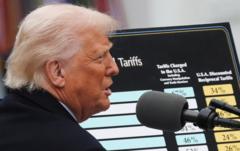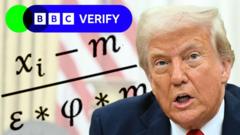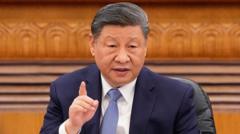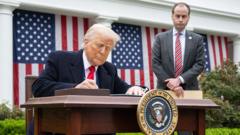The president's new tariffs, aimed at various nations, could elevate prices for American consumers and spark global economic changes.
Trump's Tariff Announcement: A Bold Move that Could Reshape the Global Economy

Trump's Tariff Announcement: A Bold Move that Could Reshape the Global Economy
In an unprecedented move, Donald Trump has enacted sweeping tariffs that could alter the trade landscape.
Trump's approach to tariffs, a consistent theme throughout his political career, culminated in a significant announcement at the White House's Rose Garden. He declared new tariffs, ranging up to 53% on China and 20% on the European Union and South Korea, gathering support from a crowd of allies and advisors. In a speech emphasizing his long-standing beliefs in trade policy, he acknowledged anticipated resistance from "globalists" and "special interests" but urged Americans to trust his instincts.
"This is our moment to shift the tide back to America," Trump proclaimed, reflecting on historical trade dynamics that once positioned the U.S. as a dominant global power. The implications of his tariffs are immense, with economic experts warning that they may provoke price hikes for consumers and accelerate a potential recession, with predictions soaring to a 50% risk that the U.S. economy may falter.
Critics, including former IMF economist Ken Rogoff, labeled the move as a "nuclear bomb" for global trade, suggesting it could alienate important allies and ignite trade wars. Countries such as Japan and South Korea, deemed vital partners against Chinese expansion, expressed intentions to unite in response to the tariffs.
Should Trump succeed in his ambitious vision, he aims to reinvigorate American manufacturing and reduce reliance on overseas supply chains, a response to vulnerabilities exposed during the COVID pandemic. Yet, many analysts deem his goals unrealistic, even as he calls this initiative America's "liberation day."
Overall, the announcement signals a potential turning point in economic policy, with Trump's confidence juxtaposed against the looming uncertainties. Will this strategy define a historic achievement, or lead to consequences that tarnish his legacy? Only time will reveal if Trump’s bold gamble pays off or spirals into a moment of notoriety.
"This is our moment to shift the tide back to America," Trump proclaimed, reflecting on historical trade dynamics that once positioned the U.S. as a dominant global power. The implications of his tariffs are immense, with economic experts warning that they may provoke price hikes for consumers and accelerate a potential recession, with predictions soaring to a 50% risk that the U.S. economy may falter.
Critics, including former IMF economist Ken Rogoff, labeled the move as a "nuclear bomb" for global trade, suggesting it could alienate important allies and ignite trade wars. Countries such as Japan and South Korea, deemed vital partners against Chinese expansion, expressed intentions to unite in response to the tariffs.
Should Trump succeed in his ambitious vision, he aims to reinvigorate American manufacturing and reduce reliance on overseas supply chains, a response to vulnerabilities exposed during the COVID pandemic. Yet, many analysts deem his goals unrealistic, even as he calls this initiative America's "liberation day."
Overall, the announcement signals a potential turning point in economic policy, with Trump's confidence juxtaposed against the looming uncertainties. Will this strategy define a historic achievement, or lead to consequences that tarnish his legacy? Only time will reveal if Trump’s bold gamble pays off or spirals into a moment of notoriety.






















